University Taxation Law Report: Principles of Taxation Law, 200869
VerifiedAdded on 2022/08/12
|7
|1749
|21
Report
AI Summary
This report addresses the tax implications for Rob, an Australian citizen living in New Zealand, focusing on his residency status and capital gains tax (CGT) obligations. It examines whether Rob qualifies as an Australian resident for tax purposes, considering his permanent residence in Australia for CGT, despite not residing there. The report analyzes the application of relevant legislation, including the Income Tax Assessment Act (ITAA) 1997 and the Treasury Laws Amendment (Reducing Pressure on Housing Affordability Measures) Bill 2019, and relevant case law such as Miller v FCT, Levene v IRC and IRC v Lysaght. The analysis considers whether Rob's property in Sydney, 10 Snapper Street, qualifies as his main residence for CGT purposes, considering that he has not resided in Australia for eight years and the impact of the recent amendment bill. The report concludes that Rob is a foreign resident for taxation purposes and provides advice on how he can minimize his tax liability, including the timing of any potential sale of his property to take advantage of the main residence exemption.
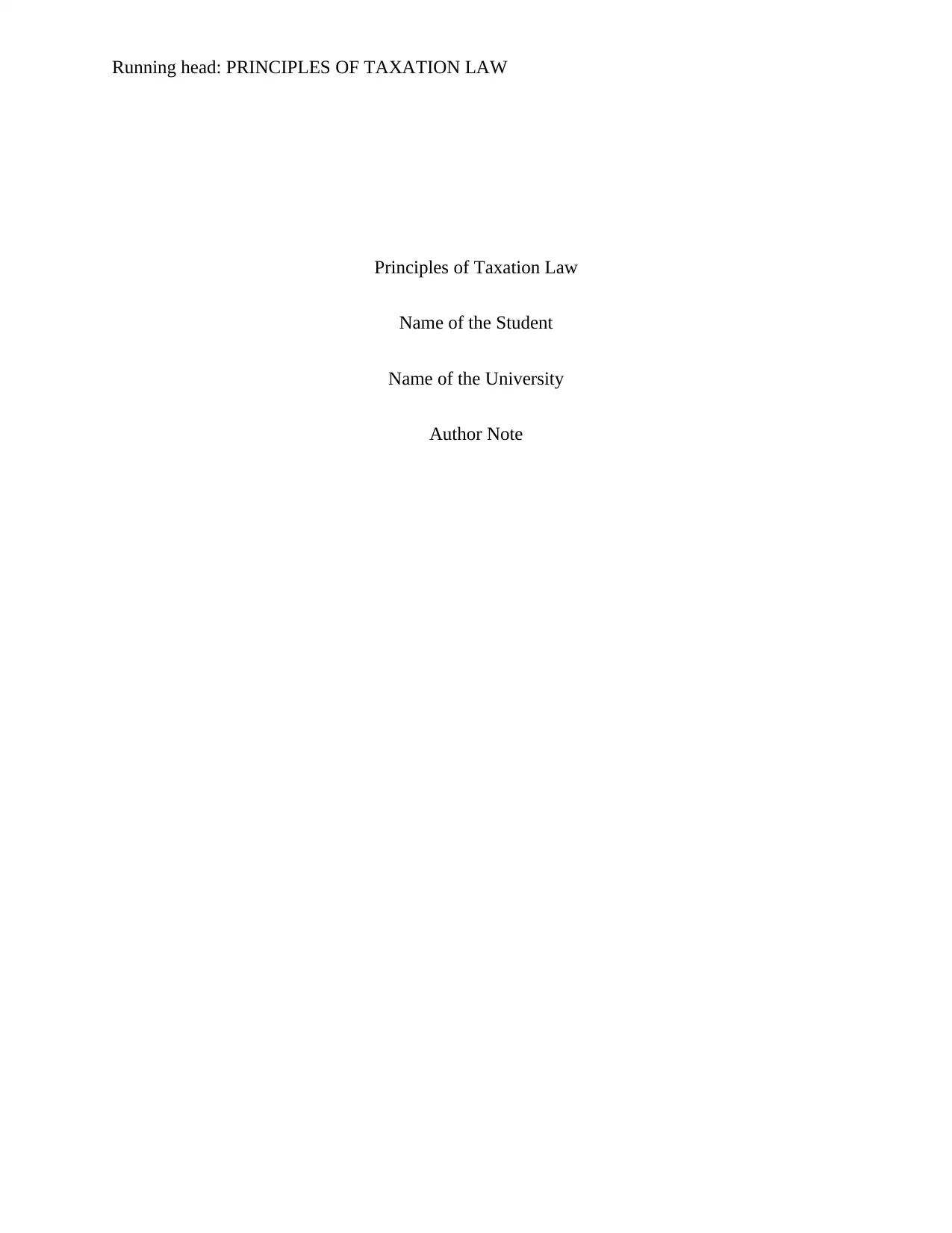
Running head: PRINCIPLES OF TAXATION LAW
Principles of Taxation Law
Name of the Student
Name of the University
Author Note
Principles of Taxation Law
Name of the Student
Name of the University
Author Note
Paraphrase This Document
Need a fresh take? Get an instant paraphrase of this document with our AI Paraphraser
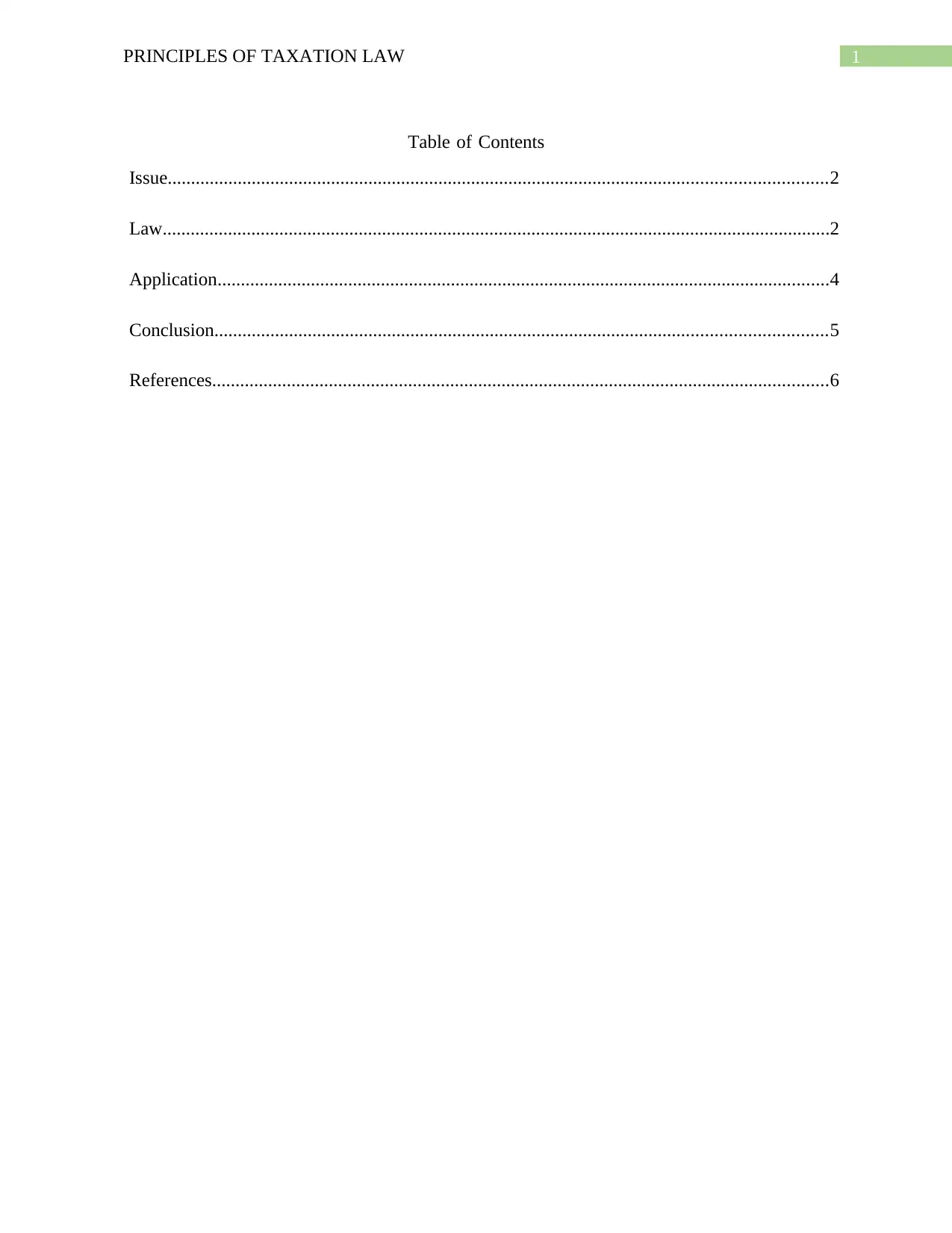
1PRINCIPLES OF TAXATION LAW
Table of Contents
Issue.............................................................................................................................................2
Law...............................................................................................................................................2
Application...................................................................................................................................4
Conclusion...................................................................................................................................5
References....................................................................................................................................6
Table of Contents
Issue.............................................................................................................................................2
Law...............................................................................................................................................2
Application...................................................................................................................................4
Conclusion...................................................................................................................................5
References....................................................................................................................................6
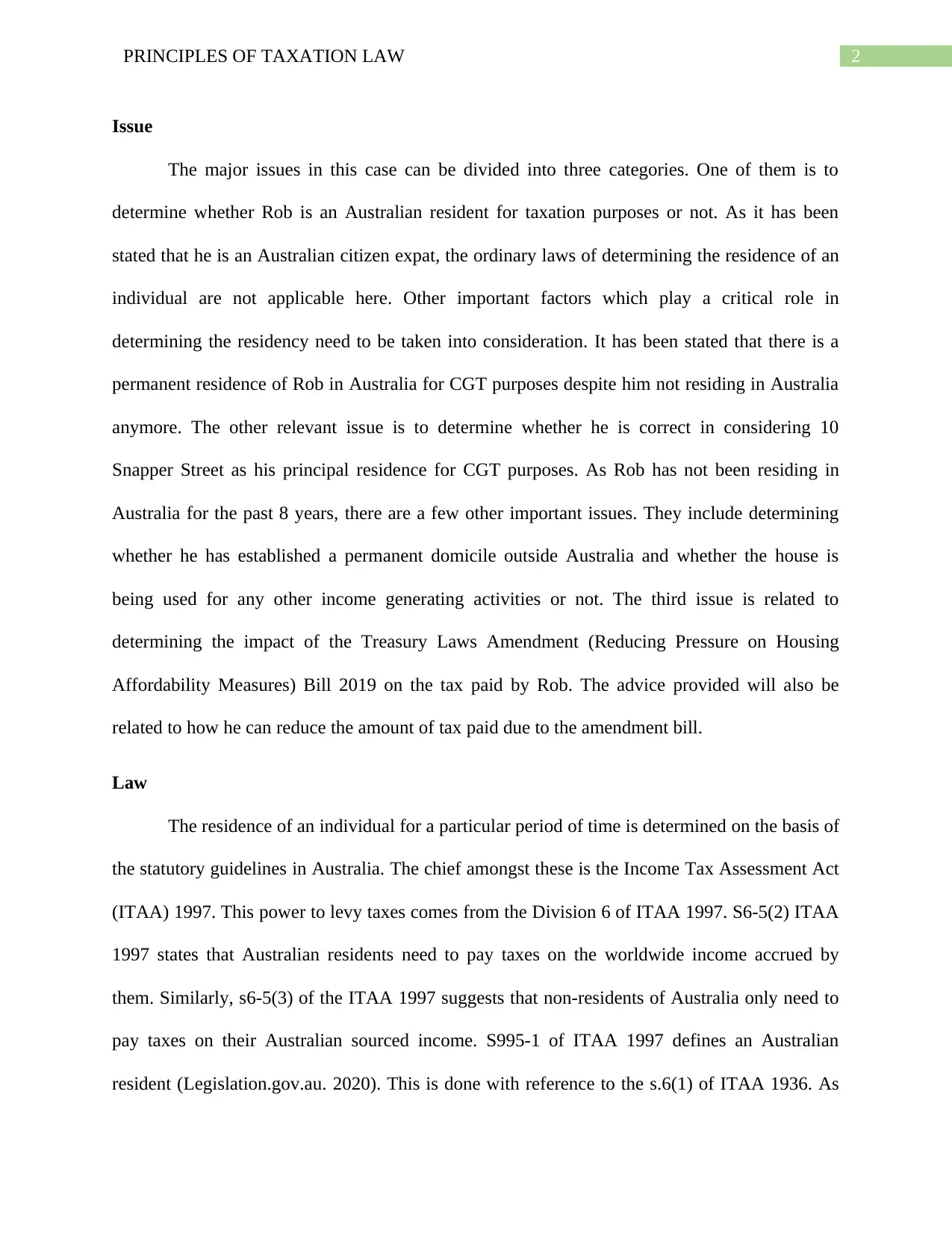
2PRINCIPLES OF TAXATION LAW
Issue
The major issues in this case can be divided into three categories. One of them is to
determine whether Rob is an Australian resident for taxation purposes or not. As it has been
stated that he is an Australian citizen expat, the ordinary laws of determining the residence of an
individual are not applicable here. Other important factors which play a critical role in
determining the residency need to be taken into consideration. It has been stated that there is a
permanent residence of Rob in Australia for CGT purposes despite him not residing in Australia
anymore. The other relevant issue is to determine whether he is correct in considering 10
Snapper Street as his principal residence for CGT purposes. As Rob has not been residing in
Australia for the past 8 years, there are a few other important issues. They include determining
whether he has established a permanent domicile outside Australia and whether the house is
being used for any other income generating activities or not. The third issue is related to
determining the impact of the Treasury Laws Amendment (Reducing Pressure on Housing
Affordability Measures) Bill 2019 on the tax paid by Rob. The advice provided will also be
related to how he can reduce the amount of tax paid due to the amendment bill.
Law
The residence of an individual for a particular period of time is determined on the basis of
the statutory guidelines in Australia. The chief amongst these is the Income Tax Assessment Act
(ITAA) 1997. This power to levy taxes comes from the Division 6 of ITAA 1997. S6-5(2) ITAA
1997 states that Australian residents need to pay taxes on the worldwide income accrued by
them. Similarly, s6-5(3) of the ITAA 1997 suggests that non-residents of Australia only need to
pay taxes on their Australian sourced income. S995-1 of ITAA 1997 defines an Australian
resident (Legislation.gov.au. 2020). This is done with reference to the s.6(1) of ITAA 1936. As
Issue
The major issues in this case can be divided into three categories. One of them is to
determine whether Rob is an Australian resident for taxation purposes or not. As it has been
stated that he is an Australian citizen expat, the ordinary laws of determining the residence of an
individual are not applicable here. Other important factors which play a critical role in
determining the residency need to be taken into consideration. It has been stated that there is a
permanent residence of Rob in Australia for CGT purposes despite him not residing in Australia
anymore. The other relevant issue is to determine whether he is correct in considering 10
Snapper Street as his principal residence for CGT purposes. As Rob has not been residing in
Australia for the past 8 years, there are a few other important issues. They include determining
whether he has established a permanent domicile outside Australia and whether the house is
being used for any other income generating activities or not. The third issue is related to
determining the impact of the Treasury Laws Amendment (Reducing Pressure on Housing
Affordability Measures) Bill 2019 on the tax paid by Rob. The advice provided will also be
related to how he can reduce the amount of tax paid due to the amendment bill.
Law
The residence of an individual for a particular period of time is determined on the basis of
the statutory guidelines in Australia. The chief amongst these is the Income Tax Assessment Act
(ITAA) 1997. This power to levy taxes comes from the Division 6 of ITAA 1997. S6-5(2) ITAA
1997 states that Australian residents need to pay taxes on the worldwide income accrued by
them. Similarly, s6-5(3) of the ITAA 1997 suggests that non-residents of Australia only need to
pay taxes on their Australian sourced income. S995-1 of ITAA 1997 defines an Australian
resident (Legislation.gov.au. 2020). This is done with reference to the s.6(1) of ITAA 1936. As
⊘ This is a preview!⊘
Do you want full access?
Subscribe today to unlock all pages.

Trusted by 1+ million students worldwide
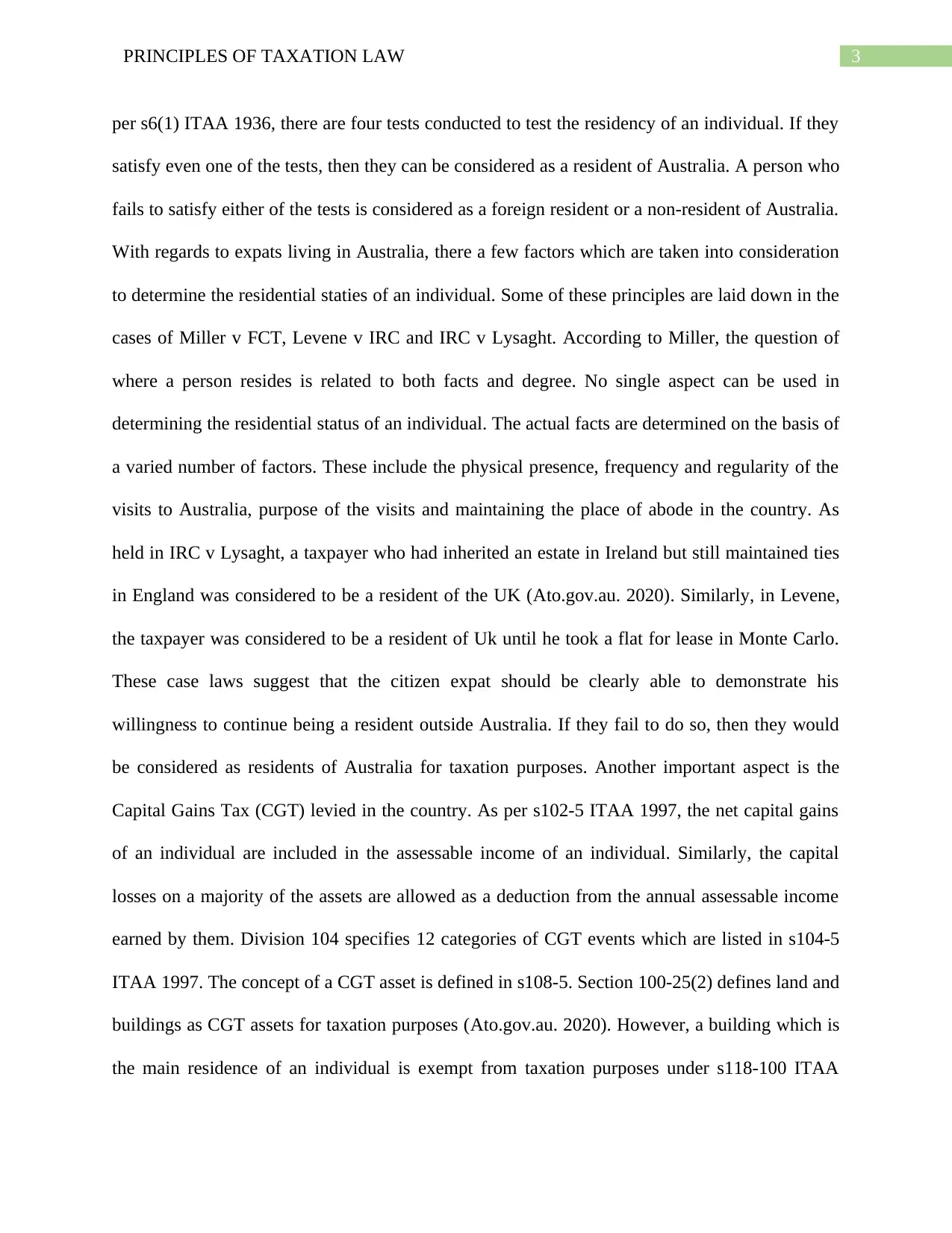
3PRINCIPLES OF TAXATION LAW
per s6(1) ITAA 1936, there are four tests conducted to test the residency of an individual. If they
satisfy even one of the tests, then they can be considered as a resident of Australia. A person who
fails to satisfy either of the tests is considered as a foreign resident or a non-resident of Australia.
With regards to expats living in Australia, there a few factors which are taken into consideration
to determine the residential staties of an individual. Some of these principles are laid down in the
cases of Miller v FCT, Levene v IRC and IRC v Lysaght. According to Miller, the question of
where a person resides is related to both facts and degree. No single aspect can be used in
determining the residential status of an individual. The actual facts are determined on the basis of
a varied number of factors. These include the physical presence, frequency and regularity of the
visits to Australia, purpose of the visits and maintaining the place of abode in the country. As
held in IRC v Lysaght, a taxpayer who had inherited an estate in Ireland but still maintained ties
in England was considered to be a resident of the UK (Ato.gov.au. 2020). Similarly, in Levene,
the taxpayer was considered to be a resident of Uk until he took a flat for lease in Monte Carlo.
These case laws suggest that the citizen expat should be clearly able to demonstrate his
willingness to continue being a resident outside Australia. If they fail to do so, then they would
be considered as residents of Australia for taxation purposes. Another important aspect is the
Capital Gains Tax (CGT) levied in the country. As per s102-5 ITAA 1997, the net capital gains
of an individual are included in the assessable income of an individual. Similarly, the capital
losses on a majority of the assets are allowed as a deduction from the annual assessable income
earned by them. Division 104 specifies 12 categories of CGT events which are listed in s104-5
ITAA 1997. The concept of a CGT asset is defined in s108-5. Section 100-25(2) defines land and
buildings as CGT assets for taxation purposes (Ato.gov.au. 2020). However, a building which is
the main residence of an individual is exempt from taxation purposes under s118-100 ITAA
per s6(1) ITAA 1936, there are four tests conducted to test the residency of an individual. If they
satisfy even one of the tests, then they can be considered as a resident of Australia. A person who
fails to satisfy either of the tests is considered as a foreign resident or a non-resident of Australia.
With regards to expats living in Australia, there a few factors which are taken into consideration
to determine the residential staties of an individual. Some of these principles are laid down in the
cases of Miller v FCT, Levene v IRC and IRC v Lysaght. According to Miller, the question of
where a person resides is related to both facts and degree. No single aspect can be used in
determining the residential status of an individual. The actual facts are determined on the basis of
a varied number of factors. These include the physical presence, frequency and regularity of the
visits to Australia, purpose of the visits and maintaining the place of abode in the country. As
held in IRC v Lysaght, a taxpayer who had inherited an estate in Ireland but still maintained ties
in England was considered to be a resident of the UK (Ato.gov.au. 2020). Similarly, in Levene,
the taxpayer was considered to be a resident of Uk until he took a flat for lease in Monte Carlo.
These case laws suggest that the citizen expat should be clearly able to demonstrate his
willingness to continue being a resident outside Australia. If they fail to do so, then they would
be considered as residents of Australia for taxation purposes. Another important aspect is the
Capital Gains Tax (CGT) levied in the country. As per s102-5 ITAA 1997, the net capital gains
of an individual are included in the assessable income of an individual. Similarly, the capital
losses on a majority of the assets are allowed as a deduction from the annual assessable income
earned by them. Division 104 specifies 12 categories of CGT events which are listed in s104-5
ITAA 1997. The concept of a CGT asset is defined in s108-5. Section 100-25(2) defines land and
buildings as CGT assets for taxation purposes (Ato.gov.au. 2020). However, a building which is
the main residence of an individual is exempt from taxation purposes under s118-100 ITAA
Paraphrase This Document
Need a fresh take? Get an instant paraphrase of this document with our AI Paraphraser
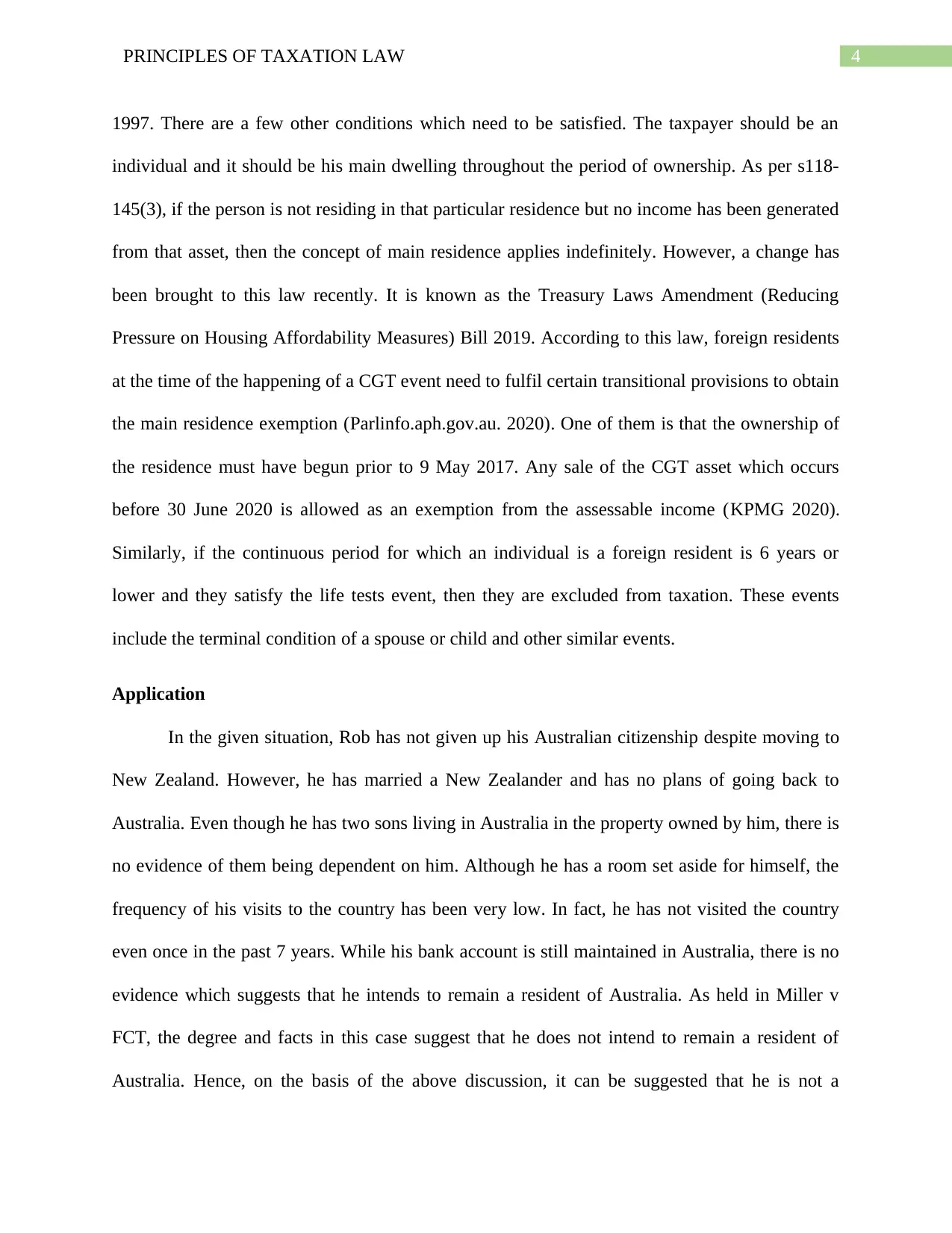
4PRINCIPLES OF TAXATION LAW
1997. There are a few other conditions which need to be satisfied. The taxpayer should be an
individual and it should be his main dwelling throughout the period of ownership. As per s118-
145(3), if the person is not residing in that particular residence but no income has been generated
from that asset, then the concept of main residence applies indefinitely. However, a change has
been brought to this law recently. It is known as the Treasury Laws Amendment (Reducing
Pressure on Housing Affordability Measures) Bill 2019. According to this law, foreign residents
at the time of the happening of a CGT event need to fulfil certain transitional provisions to obtain
the main residence exemption (Parlinfo.aph.gov.au. 2020). One of them is that the ownership of
the residence must have begun prior to 9 May 2017. Any sale of the CGT asset which occurs
before 30 June 2020 is allowed as an exemption from the assessable income (KPMG 2020).
Similarly, if the continuous period for which an individual is a foreign resident is 6 years or
lower and they satisfy the life tests event, then they are excluded from taxation. These events
include the terminal condition of a spouse or child and other similar events.
Application
In the given situation, Rob has not given up his Australian citizenship despite moving to
New Zealand. However, he has married a New Zealander and has no plans of going back to
Australia. Even though he has two sons living in Australia in the property owned by him, there is
no evidence of them being dependent on him. Although he has a room set aside for himself, the
frequency of his visits to the country has been very low. In fact, he has not visited the country
even once in the past 7 years. While his bank account is still maintained in Australia, there is no
evidence which suggests that he intends to remain a resident of Australia. As held in Miller v
FCT, the degree and facts in this case suggest that he does not intend to remain a resident of
Australia. Hence, on the basis of the above discussion, it can be suggested that he is not a
1997. There are a few other conditions which need to be satisfied. The taxpayer should be an
individual and it should be his main dwelling throughout the period of ownership. As per s118-
145(3), if the person is not residing in that particular residence but no income has been generated
from that asset, then the concept of main residence applies indefinitely. However, a change has
been brought to this law recently. It is known as the Treasury Laws Amendment (Reducing
Pressure on Housing Affordability Measures) Bill 2019. According to this law, foreign residents
at the time of the happening of a CGT event need to fulfil certain transitional provisions to obtain
the main residence exemption (Parlinfo.aph.gov.au. 2020). One of them is that the ownership of
the residence must have begun prior to 9 May 2017. Any sale of the CGT asset which occurs
before 30 June 2020 is allowed as an exemption from the assessable income (KPMG 2020).
Similarly, if the continuous period for which an individual is a foreign resident is 6 years or
lower and they satisfy the life tests event, then they are excluded from taxation. These events
include the terminal condition of a spouse or child and other similar events.
Application
In the given situation, Rob has not given up his Australian citizenship despite moving to
New Zealand. However, he has married a New Zealander and has no plans of going back to
Australia. Even though he has two sons living in Australia in the property owned by him, there is
no evidence of them being dependent on him. Although he has a room set aside for himself, the
frequency of his visits to the country has been very low. In fact, he has not visited the country
even once in the past 7 years. While his bank account is still maintained in Australia, there is no
evidence which suggests that he intends to remain a resident of Australia. As held in Miller v
FCT, the degree and facts in this case suggest that he does not intend to remain a resident of
Australia. Hence, on the basis of the above discussion, it can be suggested that he is not a
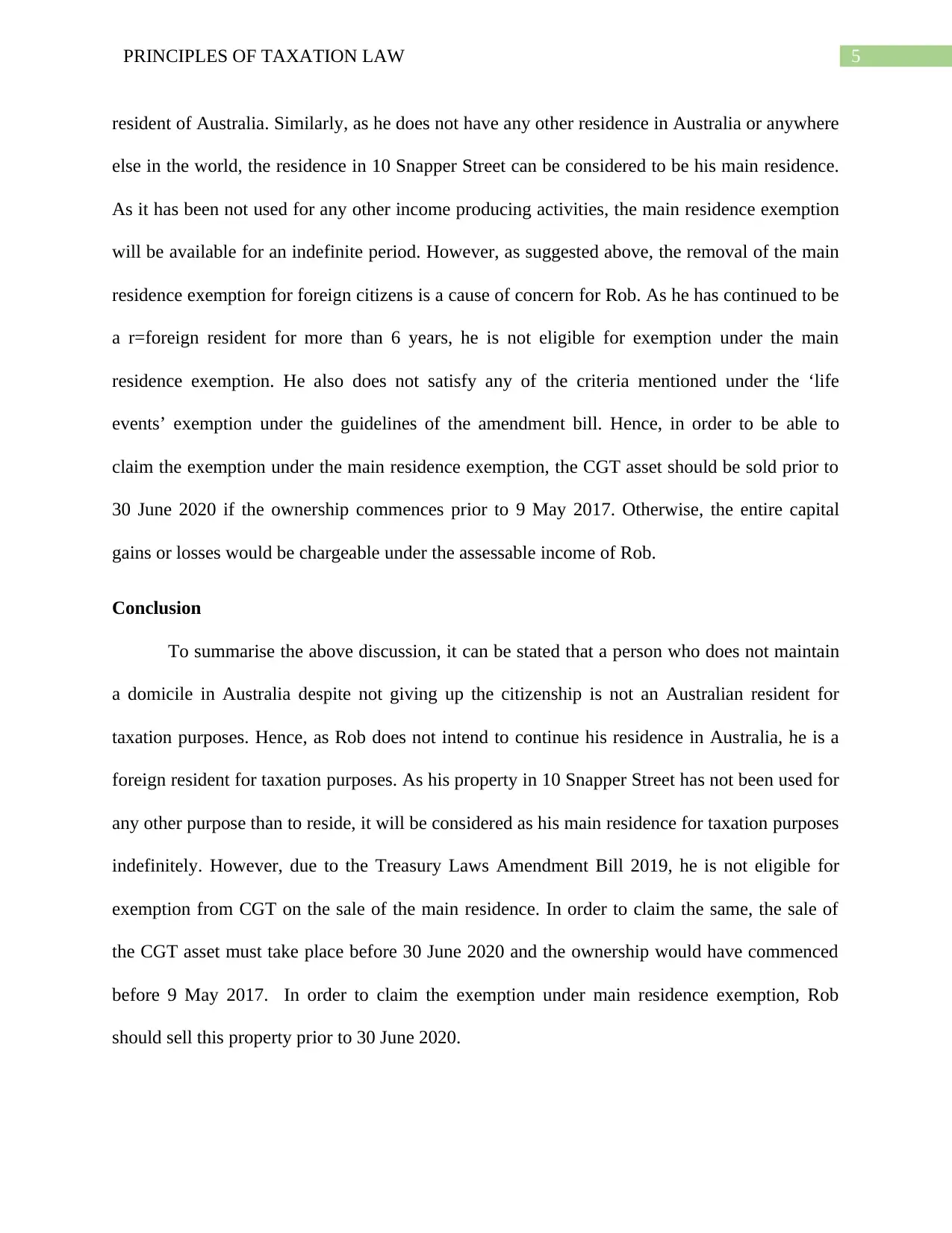
5PRINCIPLES OF TAXATION LAW
resident of Australia. Similarly, as he does not have any other residence in Australia or anywhere
else in the world, the residence in 10 Snapper Street can be considered to be his main residence.
As it has been not used for any other income producing activities, the main residence exemption
will be available for an indefinite period. However, as suggested above, the removal of the main
residence exemption for foreign citizens is a cause of concern for Rob. As he has continued to be
a r=foreign resident for more than 6 years, he is not eligible for exemption under the main
residence exemption. He also does not satisfy any of the criteria mentioned under the ‘life
events’ exemption under the guidelines of the amendment bill. Hence, in order to be able to
claim the exemption under the main residence exemption, the CGT asset should be sold prior to
30 June 2020 if the ownership commences prior to 9 May 2017. Otherwise, the entire capital
gains or losses would be chargeable under the assessable income of Rob.
Conclusion
To summarise the above discussion, it can be stated that a person who does not maintain
a domicile in Australia despite not giving up the citizenship is not an Australian resident for
taxation purposes. Hence, as Rob does not intend to continue his residence in Australia, he is a
foreign resident for taxation purposes. As his property in 10 Snapper Street has not been used for
any other purpose than to reside, it will be considered as his main residence for taxation purposes
indefinitely. However, due to the Treasury Laws Amendment Bill 2019, he is not eligible for
exemption from CGT on the sale of the main residence. In order to claim the same, the sale of
the CGT asset must take place before 30 June 2020 and the ownership would have commenced
before 9 May 2017. In order to claim the exemption under main residence exemption, Rob
should sell this property prior to 30 June 2020.
resident of Australia. Similarly, as he does not have any other residence in Australia or anywhere
else in the world, the residence in 10 Snapper Street can be considered to be his main residence.
As it has been not used for any other income producing activities, the main residence exemption
will be available for an indefinite period. However, as suggested above, the removal of the main
residence exemption for foreign citizens is a cause of concern for Rob. As he has continued to be
a r=foreign resident for more than 6 years, he is not eligible for exemption under the main
residence exemption. He also does not satisfy any of the criteria mentioned under the ‘life
events’ exemption under the guidelines of the amendment bill. Hence, in order to be able to
claim the exemption under the main residence exemption, the CGT asset should be sold prior to
30 June 2020 if the ownership commences prior to 9 May 2017. Otherwise, the entire capital
gains or losses would be chargeable under the assessable income of Rob.
Conclusion
To summarise the above discussion, it can be stated that a person who does not maintain
a domicile in Australia despite not giving up the citizenship is not an Australian resident for
taxation purposes. Hence, as Rob does not intend to continue his residence in Australia, he is a
foreign resident for taxation purposes. As his property in 10 Snapper Street has not been used for
any other purpose than to reside, it will be considered as his main residence for taxation purposes
indefinitely. However, due to the Treasury Laws Amendment Bill 2019, he is not eligible for
exemption from CGT on the sale of the main residence. In order to claim the same, the sale of
the CGT asset must take place before 30 June 2020 and the ownership would have commenced
before 9 May 2017. In order to claim the exemption under main residence exemption, Rob
should sell this property prior to 30 June 2020.
⊘ This is a preview!⊘
Do you want full access?
Subscribe today to unlock all pages.

Trusted by 1+ million students worldwide
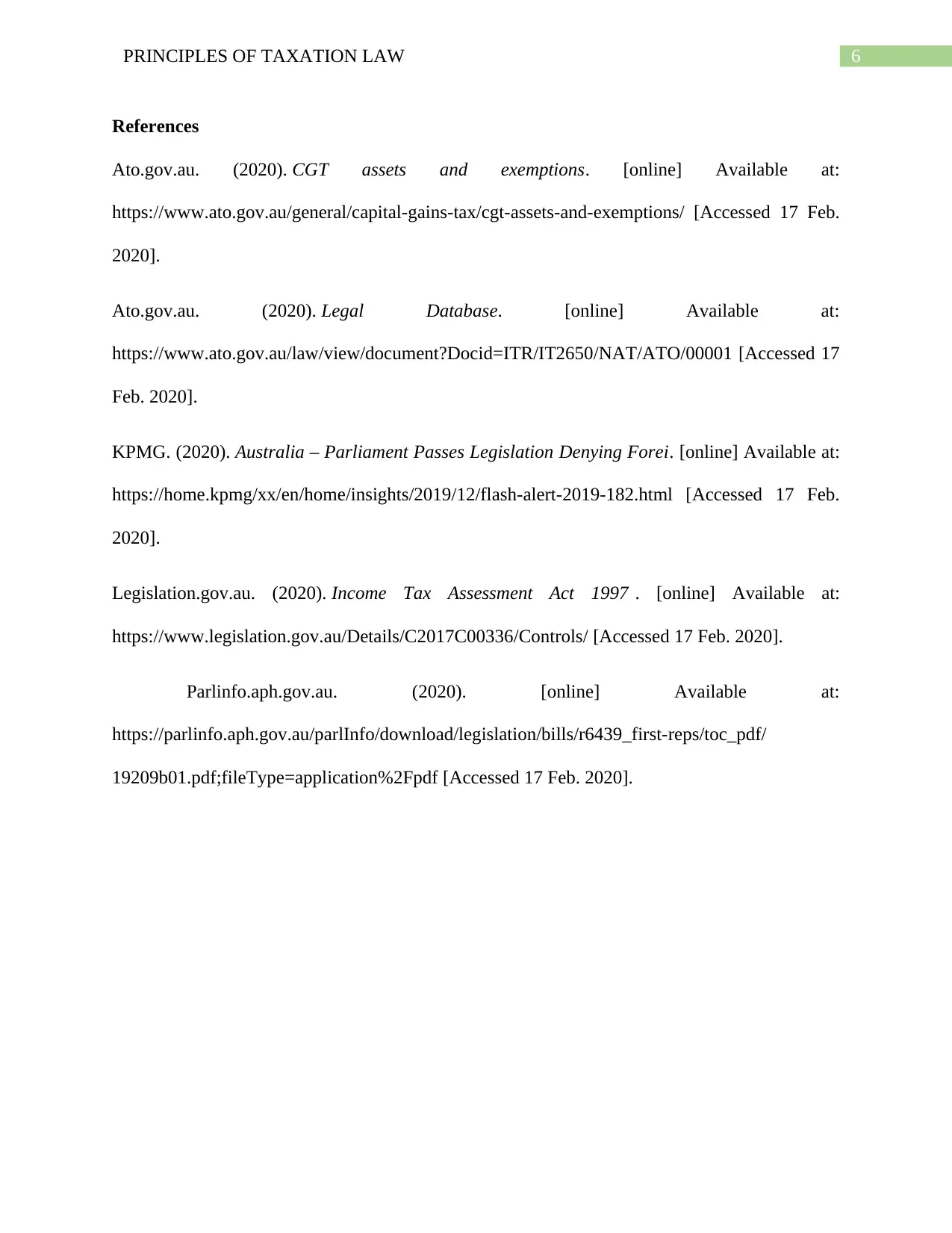
6PRINCIPLES OF TAXATION LAW
References
Ato.gov.au. (2020). CGT assets and exemptions. [online] Available at:
https://www.ato.gov.au/general/capital-gains-tax/cgt-assets-and-exemptions/ [Accessed 17 Feb.
2020].
Ato.gov.au. (2020). Legal Database. [online] Available at:
https://www.ato.gov.au/law/view/document?Docid=ITR/IT2650/NAT/ATO/00001 [Accessed 17
Feb. 2020].
KPMG. (2020). Australia – Parliament Passes Legislation Denying Forei. [online] Available at:
https://home.kpmg/xx/en/home/insights/2019/12/flash-alert-2019-182.html [Accessed 17 Feb.
2020].
Legislation.gov.au. (2020). Income Tax Assessment Act 1997 . [online] Available at:
https://www.legislation.gov.au/Details/C2017C00336/Controls/ [Accessed 17 Feb. 2020].
Parlinfo.aph.gov.au. (2020). [online] Available at:
https://parlinfo.aph.gov.au/parlInfo/download/legislation/bills/r6439_first-reps/toc_pdf/
19209b01.pdf;fileType=application%2Fpdf [Accessed 17 Feb. 2020].
References
Ato.gov.au. (2020). CGT assets and exemptions. [online] Available at:
https://www.ato.gov.au/general/capital-gains-tax/cgt-assets-and-exemptions/ [Accessed 17 Feb.
2020].
Ato.gov.au. (2020). Legal Database. [online] Available at:
https://www.ato.gov.au/law/view/document?Docid=ITR/IT2650/NAT/ATO/00001 [Accessed 17
Feb. 2020].
KPMG. (2020). Australia – Parliament Passes Legislation Denying Forei. [online] Available at:
https://home.kpmg/xx/en/home/insights/2019/12/flash-alert-2019-182.html [Accessed 17 Feb.
2020].
Legislation.gov.au. (2020). Income Tax Assessment Act 1997 . [online] Available at:
https://www.legislation.gov.au/Details/C2017C00336/Controls/ [Accessed 17 Feb. 2020].
Parlinfo.aph.gov.au. (2020). [online] Available at:
https://parlinfo.aph.gov.au/parlInfo/download/legislation/bills/r6439_first-reps/toc_pdf/
19209b01.pdf;fileType=application%2Fpdf [Accessed 17 Feb. 2020].
1 out of 7
Related Documents
Your All-in-One AI-Powered Toolkit for Academic Success.
+13062052269
info@desklib.com
Available 24*7 on WhatsApp / Email
![[object Object]](/_next/static/media/star-bottom.7253800d.svg)
Unlock your academic potential
Copyright © 2020–2026 A2Z Services. All Rights Reserved. Developed and managed by ZUCOL.





